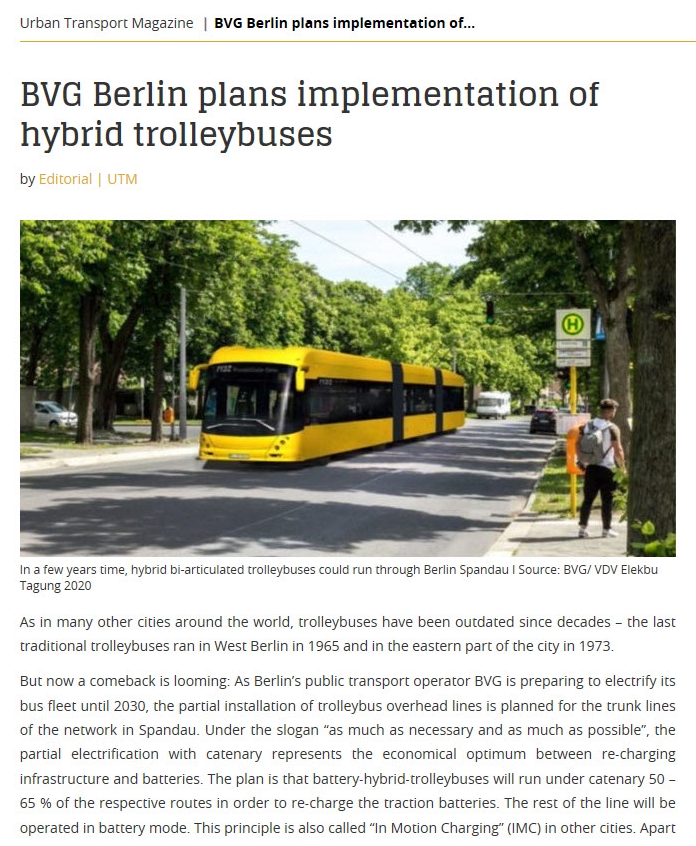Latest news
The latest news item was posted 1976 days ago:
22.09.2020 :
Temporary change of web domain
08.09.2020 :
Ceneri Base Tunnel opens
08.09.2020 :
Liechtenstein S-Bahn rejected
08.09.2020 :
Flexity not yet in service
08.09.2020 :
Zürich's first Flexity
older news items
all news for current year index, on one page
This website:
news search.
Zürich tram home page.
photos.
events diary.
Zürich tram links.
guestbook.
Trolleybuses for Berlin?
filed on: 04.03.2020 (4th Mar 2020)
It is often implied that trolleybuses are a difficult proposition to sell. Numerous trolleybus systems have vanished between the 1960s and the present day. Even in relatively recent years in Switzerland, often considered a stronghold of common sense and trolleybuses, we have seen the disappearance of trolleybuses from Lugano, Basel, La Chaux de Fonds with Schaffhausen and Winterthur surviving only be the skin of their teeth. In the case of Schaffhausen the risk is maybe not yet over as the town is looking at battery buses.
Trams have seen a huge revival all across the globe. There have been some new trolleybus system too, but not on a scale in any way comparable to that of trams. With the recent trend towards green energy and electrification, it might have seemed that a new opportunity was opening for trolleybuses. But the limelight was stolen by hybrid and battery buses.
One interesting development has been that of trolleybuses with increased battery range. Besides being able to deviate from their usual route, for example to circumvent roadworks, cost savings can be obtained by simplifying junctions and removing the wires on entire segments of route. Wiring a junction is far more costly than wiring a straight section of road. So on the one hand such trolleybuses are leading to an erosion of classical trolleybus operation while at the same time new routes can be electrified at lower cost.
So are battery trolleybuses the beginning of the slow abolition of trolleybuses, or can they help re-grow lost systems? Is the glass half full or half empty? Positive signs are recently coming from Berlin, a city that lost its trolleybuses decades ago, but where there are now plans to electrify four routes using an "in motion charging" (IMC) system similar to that of Zürich.
Initially, line M32 will be elctrified as a pilot line and equipped with double articulated trolleybuses. In the longer term 15 lines could be converted, costing some 300 million Euros, including 190 vehicles operating on 235km, of which 148 wired. Initial investment is 50% higher than for a comparable battery system.
source: Urban Transport Magazine
This news item is from the 2020 newslog.
search Zürich tram news archive
news index for 2026
all news for current year
Zürich tram homepage
to link to this item please use:
http://www.proaktiva.ch/tram/zurich/newslog/newsitem.php?year=2020&item=040320
